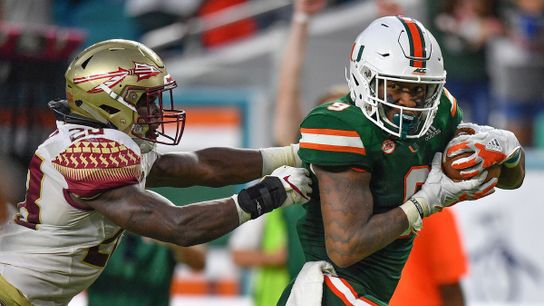No one has done more to bring the name, image and likeness issue for college athletes more to the national forefront than the Florida state legislature.
Those lawmakers were not the first to note there's something wrong with the NCAA's economic model and to do something about it. Far from it, in fact. Florida wasn't even the first state legislature to pass its own NIL law; that honor belongs to California's Fair Pay to Play Act, signed into law way back on Sept. 30, 2019.
But Florida's law, signed by governor Ron DeSantis on June 12, 2020, is the first to come to life. That bill is set to come into effect on July 1 of this year, which effectively turned Florida's bill into a soft deadline for the NCAA and for Congress to figure something out.
Florida's bill inspired Alabama and Mississippi to begin their state laws on July 1. Georgia's version, not yet signed into law, would begin July 1. Heck, Florida's bill inspired California's legislature to consider bumping its first-in-the-nation effective date forward a whole year, from Jan. 1, 2023 to Jan. 1, 2022.
But with a single movement on Wednesday night, Florida could move from first in line to last.
Tucked into a bill regarding other educational issues, jammed into action at the end of the legislative session, Florida's senate has approved a provision that will delay Florida's effective date from July 1, 2021 to July 1, 2022.
McKenzie Milton, set to use his status as Florida State's starting quarterback for this season and this season only, would be shut out of the NIL market by the change. Milton has undoubtedly already held conversations about how to translate his inspiring comeback story into endorsements, and now stands to see that income wiped away with the stroke of a pen.
Other Florida luminaries have weighed in as well. According to Sports Illustrated, the amendment was created -- and passed without resistance -- on the advice of the Florida legislature's education staff. That group feared the NCAA would punish Florida athletes who created NIL deals, despite NCAA president Mark Emmert saying his organization had no plans to do so. The author of the amendment says he'd like to see Emmert state that in writing in order to feel comfortable returning to the original July 1 date. However, now that the amendment is in the bill, it's in the bill. As part of the political process, the NIL amendment was stuffed into a bill nominally focused on other educational issues. Those issues, according to the Tallahassee Democrat, are important to the Republican Party, of which Gov. DeSantis is a member: The bind he's in now is: Either he signs a bill that delays one of his signature policies, or he vetoes it, meaning he also vetoes the transgender athlete ban and charter school provisions. So DeSantis can either anger members of his political party, or he can anger some of the most visible and most popular people in his state -- while delaying a cause he himself championed when he signed the bill into law last summer.
To be clear, Florida's upcoming senior athletes wouldn't necessarily be shut out of the NIL market for good even if DeSantis signs the new bill into law. The July 1 date is still viewed as a soft deadline nationally, and so Florida's athletes would be included in any national bill that Congress hypothetically passes between now and then -- although that possibility shrinks by the day, with Saturday marking two months to July 1.
Even so, with one stroke of one politician's pen, Florida's athletes could move from being ahead of any national policy to suddenly finding themselves at the mercy of Congress and/or the NCAA.
As always, stay tuned to The Scoop for the latest.
